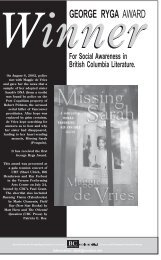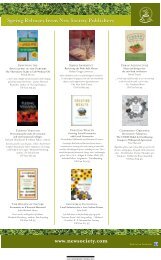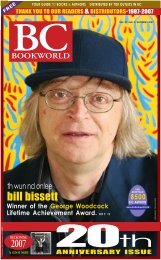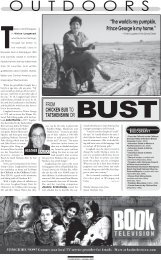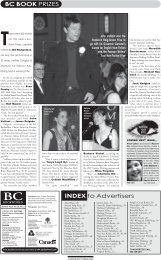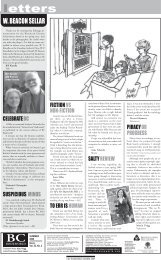Autumn 2011 Volume 25 - No 3 - BC BookWorld
Autumn 2011 Volume 25 - No 3 - BC BookWorld
Autumn 2011 Volume 25 - No 3 - BC BookWorld
You also want an ePaper? Increase the reach of your titles
YUMPU automatically turns print PDFs into web optimized ePapers that Google loves.
23 <strong>BC</strong> BOOKWORLD AUTUMN <strong>2011</strong><br />
LIBRARIES, eBOOKS & YOU<br />
eBOOKS ARE:<br />
1. TECHNOLOGICAL PROGRESS<br />
2. UGLIFICATION OF READING<br />
3. THE ONLY WAY FORWARD<br />
4. NOT REALLY BOOKS AT ALL<br />
5. ALL OF THE ABOVE<br />
Pick one.<br />
You’re right.<br />
The future of books and socalled<br />
eBooks—as well as libraries,<br />
publishing, bookselling and<br />
reading—is undefined and daunting<br />
territory.<br />
That’s why Canada Council<br />
hired Paul Whitney, former chief<br />
librarian for the Burnaby Public Library<br />
and the Vancouver Public Library,<br />
to investigate the impact of<br />
eBooks for Canada’s Public Lending<br />
Right program.<br />
Whitney was interviewed by<br />
B.C. <strong>BookWorld</strong>’s Alan Twigg.<br />
week after being named the specialty<br />
bookseller of the year by the Canadian<br />
Booksellers Association, the Flying<br />
Dragon Bookshop in Toronto closed.<br />
<strong>BC</strong>BW: Is it true that major Canadian<br />
research libraries are now deciding<br />
which libraries will specialize in certain<br />
kinds of books<br />
PW: There are discussions taking place<br />
on establishing “trusted repositories”<br />
across the country to coordinate the collection<br />
and preservation of both print<br />
and digital works. We are talking about<br />
the major university libraries and the two<br />
large Canadian “national” libraries [Library<br />
and Archives Canada, in Ottawa,<br />
and Bibliothèque et Archives nationales<br />
du Québec, in Montreal]. Some say that<br />
they do not have the resources to collect<br />
and preserve everything anymore, so<br />
they are proposing a solution which distributes<br />
responsibility for collecting in<br />
certain subject areas. There has been vigorous<br />
opposition from the Canadian Association<br />
of University Teachers.<br />
<strong>BC</strong>BW: What is this new, pan-European<br />
digital library called Europeana<br />
PW: Europeans got upset with the<br />
Google initiative to digitize all of the<br />
books in the world, so they want to control<br />
their own content in the digital environment.<br />
But currently European<br />
Union copyright laws are impeding library<br />
mass digitization efforts.<br />
<strong>BC</strong>BW: French president Nicolas<br />
Sarkozy has pledged 750 million euros<br />
for the digitization of France’s “cultural<br />
patrimony.”<br />
continued on page 24<br />
FUTUREWORLD<br />
UTOPIA or ANATHEMA<br />
<strong>BC</strong> BOOKWORLD: I just saw someone<br />
outdoors in a coffee shop, reading a<br />
real book. It was oddly uplifting.<br />
PAUL WHITNEY: I prefer print-onpaper<br />
books, too. I take it you don’t own<br />
a Kobo or a Kindle or a Sony Reader<br />
<strong>BC</strong>BW: I live app-free and I see eBooks<br />
as the uglification of reading. It’s an aesthetic<br />
stance.<br />
PW: I’m happy to see folks reading in<br />
whatever format they choose.<br />
<strong>BC</strong>BW: But faster, cheaper technology<br />
is not always a good thing. Look at what<br />
happened to the music industry.<br />
PW: I don’t think piracy will be as<br />
prevalent with the written text as with<br />
music. You have to remember publishing<br />
has been much slower moving to digital<br />
distribution, largely due to paranoia<br />
about losing control of the content. The<br />
executive director of the Association of<br />
Canadian Publishers [Carolyn Wood]<br />
pointed out to me that people shouldn’t<br />
be surprised by this slow move to digital.<br />
Publishing is an industry which has<br />
experienced 1.5 format changes in 500<br />
years. And that .5 change was paperbacks!<br />
[laughter]<br />
<strong>BC</strong>BW: So no wonder people are in a<br />
tizzy.<br />
PW: In the United States, in the first<br />
quarter of <strong>2011</strong>, trade print book sales<br />
were down 19%. That decline is increasing.<br />
Even if you stop and consider the<br />
U.S. economy and the bankruptcy of<br />
Borders, the second largest book chain<br />
in the U.S., much of that decline of sales<br />
is attributable to people moving to<br />
eBooks. It’s less pronounced in Canada,<br />
but it’s early days yet. I worry that conventional<br />
trade book publishers will be<br />
increasingly vulnerable with more agile<br />
eBook-only publishers not encumbered<br />
by having to deal with moving physical<br />
objects around. But the most vulnerable<br />
sector in the short term is the brick and<br />
mortar bookstore. I deeply regret that I<br />
can’t foresee a happy ending to this story.<br />
<strong>BC</strong>BW: I was in Victoria recently. They<br />
still have plenty of bookstores.<br />
PW: I think Victoria is the exception<br />
which proves the rule, aided in part by<br />
its demographic composition. Meanwhile<br />
the climate for new bookstores in<br />
Canada is dismal. Just this summer, one<br />
TWIGG PHOTO<br />
Paul Whitney<br />
has completed a<br />
new report for<br />
Canada Council<br />
on the potential<br />
impact of eBooks.<br />
“Many commentators have compared<br />
eBooks today to the early days of the<br />
automobile. With the Model T, no one could<br />
have predicted the societal impacts which<br />
would play out in the ensuing decades.”<br />
—PAUL WHITNEY



